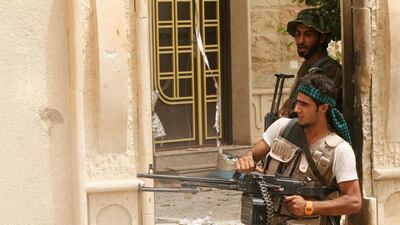BAGHDAD // ISIL suicide bombers and fighters attacked the centre of Iraq’s northern oil refinery town of Beiji overnight, forcing the army and Shiite fighters to pull back, military sources and the local mayor said on Sunday.
The town of Beiji and its refinery – Iraq’s largest – have been a battlefront for more than a year. The extremists seized the town in June 2014 as they swept through much of northern Iraq towards the capital Baghdad.
Control of Beiji neighbourhoods has changed hands many times during the conflict.
The latest ISIL offensive comes after authorities said they controlled nearly the whole town and expected to drive insurgents from the refinery within days.
The militants attacked at about 8pm on Saturday with two suicide car bombings. The blasts were followed by fierce clashes that lasted until midnight and drove the army and forces from the mainly Shiite Hashed Al Shaabi - or Shiite Popular Mobilisation Units - from the centre of town, two army colonels said.
Beiji mayor Mahmoud Al Jabouri said there had been a pattern of withdrawals by ISIL fighters in the town followed by counter-offensives.
“Their lethal weapons are suicide attacks and snipers, and this is why we have fighting back and forth.”
Army officers said the army and Hashed groups were preparing a response.
“ISIL fighters are still holding positions in three neighbourhoods in Beiji and they are still receiving reinforcements,” said one of the army colonels.
In Anbar province west of Baghdad, witnesses said two rockets hit a crowd in the ISIL-controlled provincial capital Ramadi on Saturday evening, killing at least 18 people.
They said a group of people had gathered after the daily Ramadan fast to play muhaibis, a game where players have to identify a member of the opposing team who is hiding a ring.
“I heard a blast and saw fire coming from Dolphin Square. I ran to the place and saw vehicles carrying bodies and wounded covered with blood. They were innocent people playing a ring game; they were not making bombs,” said Haj Thamir Ahmed, a Ramadi resident who lives nearby.
In north-west Baghdad, at least three people were killed and 11 wounded when a bomb went off near a restaurant in the mainly Shiite district of Shulaa on Sunday morning, police and medical sources said. Another two people were killed by a bomb in Hussainiya on the city’s northern outskirts.
There was no immediate claim of responsibility for those attacks, but statements in the name of ISIL said the group carried car bombings on Saturday in Baghdad and Balad Ruz which killed at least 19 people.
Police said the deadliest attack occurred on Saturday night when a car bomb exploded on a commercial street in Baghdad’s western neighbourhood of Amil, killing nine people and wounding 24 others.
Earlier, police said a car bomb blast near a bus stop killed three people and wounded 15 in southern Baghdad. A bomb explosion near an outdoor market killed three people in Mhamoudiya town, just south of Baghdad.
Another car bomb went off near a row of restaurants in the Shiite town of Balad Ruz, about 70km north-east of Baghdad, killing four and wounding 14.
* Reuters and Associated Press

